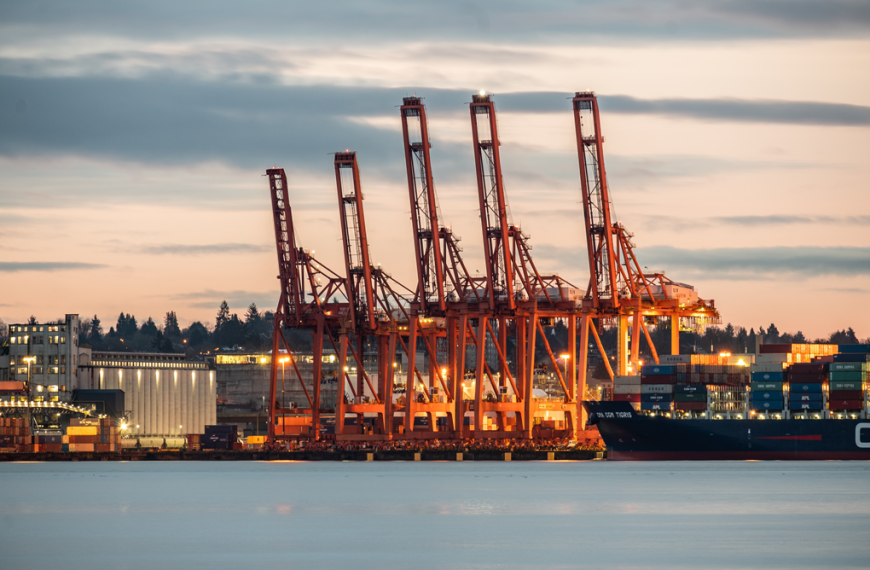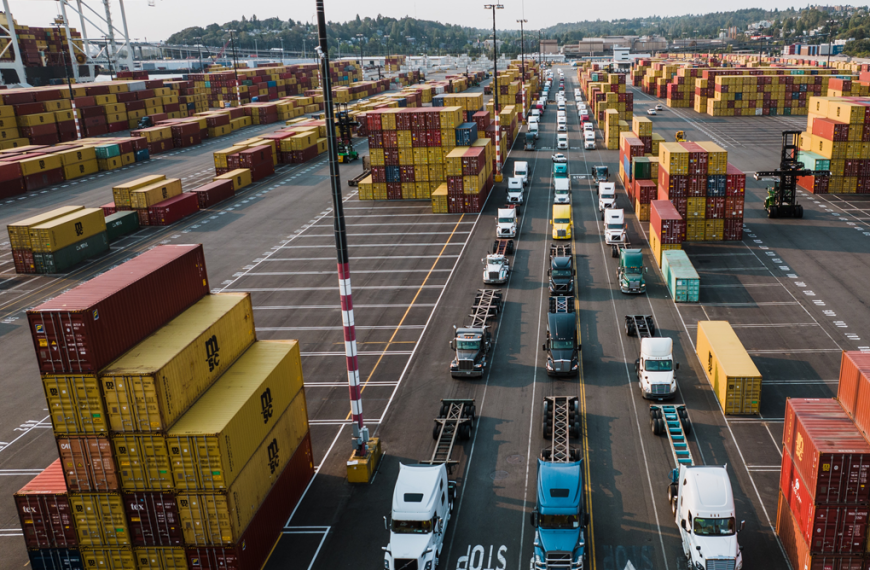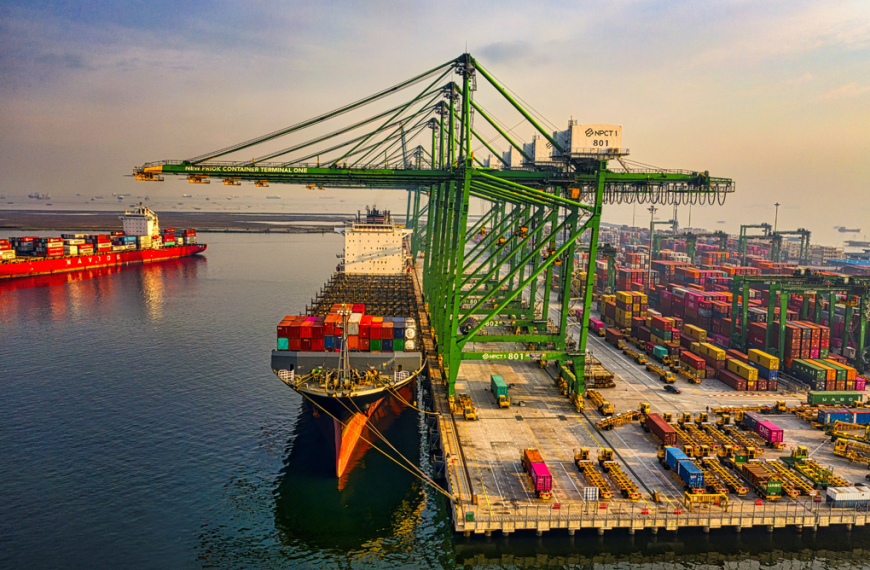Looking for reasons why digitalization should be a priority for logistics businesses in 2023? Read our blog post now! Logistics companies have a lot on their plates. From managing company logistics to freight forwarding and air or sea freight, there’s no shortage of tasks to handle. However, with the rise of digitalization, there’s a new set of challenges that require attention. In this post, we’ll explore why digitalization should be a priority for logistics businesses in 2023.
What is Digitization?
Before diving into the benefits of digitalization, let’s first define what it is. Digitization refers to the process of converting analog information into digital form. This means moving away from traditional paper-based processes and instead, relying on digital technology to manage data and streamline operations.
Cost and Time Efficiency Through Automation
One of the main benefits of digitalization is cost and time efficiency through automation. By implementing digital technologies, logistics companies can automate many of their processes, such as invoicing, inventory management, and order processing. This not only reduces the risk of errors but also speeds up the entire process, allowing for faster delivery times and increased productivity.
Real-Time Tracking
Another advantage of digitalization is real-time tracking. With digital technologies, logistics companies can track shipments in real-time, providing customers with up-to-date information on the status of their orders. This not only improves customer satisfaction but also enables logistics companies to respond quickly to any issues that arise.
Business Optimization Through Data Analytics
Digitalization also provides an opportunity for logistics companies to optimize their operations through data analytics. By collecting and analyzing data, logistics companies can identify inefficiencies in their processes and make data-driven decisions to improve their operations. This can lead to cost savings, increased productivity, and ultimately, better business outcomes.
Optimization of Internal Operations
In addition to optimizing their external operations, logistics companies can also benefit from digitalization by optimizing their internal operations. For example, digital technologies can be used to automate HR processes, such as payroll and employee onboarding, freeing up time for employees to focus on other tasks.
Customer Satisfaction
Last but not least, digitalization can improve customer satisfaction. By implementing digital technologies, logistics companies can provide customers with a seamless experience, from order placement to delivery. Real-time tracking, automation, and data analytics all contribute to a better customer experience, which can lead to increased loyalty and repeat business.
In summary, digitalization should be a priority for logistics businesses in 2023. From cost and time efficiency through automation to real-time tracking and business optimization through data analytics, there are many benefits to be gained from digitalization. By embracing digital technologies, logistics companies can improve their internal and external operations, ultimately leading to better business outcomes and increased customer satisfaction.

Cost and Time Efficiency Through Automation
One of the main benefits of digitalization is cost and time efficiency through automation. By implementing digital technologies, logistics companies can automate many of their processes, such as invoicing, inventory management, and order processing. This not only reduces the risk of errors but also speeds up the entire process, allowing for faster delivery times and increased productivity.
Real-Time Tracking
Another advantage of digitalization is real-time tracking. With digital technologies, logistics companies can track shipments in real-time, providing customers with up-to-date information on the status of their orders. This not only improves customer satisfaction but also enables logistics companies to respond quickly to any issues that arise.
Business Optimization Through Data Analytics
Digitalization also provides an opportunity for logistics companies to optimize their operations through data analytics. By collecting and analyzing data, logistics companies can identify inefficiencies in their processes and make data-driven decisions to improve their operations. This can lead to cost savings, increased productivity, and ultimately, better business outcomes.
Understanding Data Analytics
Data analytics involves the process of collecting, processing, and analyzing large sets of data to extract insights and make informed decisions. In the logistics industry, data analytics can be used to optimize processes such as transportation, inventory management, and supply chain operations. By analyzing data, logistics companies can identify inefficiencies and make data-driven decisions to improve their operations.

Benefits of Data Analytics in Logistics
There are several benefits of using data analytics in logistics, including:
- Improved efficiency: By analyzing data, logistics companies can identify inefficiencies and streamline their operations, leading to increased efficiency and productivity.
- Cost savings: By optimizing processes, logistics companies can reduce costs associated with transportation, inventory management, and other logistics operations.
- Better customer service: By using data analytics, logistics companies can gain insights into customer behavior and preferences, allowing them to provide better service and increase customer satisfaction.
- Improved decision-making: By relying on data-driven insights, logistics companies can make informed decisions that are more likely to lead to positive outcomes.
| Benefit | Description |
|---|---|
| Improved Efficiency | By analyzing data, logistics companies can identify inefficiencies and streamline their operations, leading to increased efficiency and productivity. |
| Cost Savings | By optimizing processes, logistics companies can reduce costs associated with transportation, inventory management, and other logistics operations. |
| Better Customer Service | By using data analytics, logistics companies can gain insights into customer behavior and preferences, allowing them to provide better service and increase customer satisfaction. |
| Improved Decision-Making | By relying on data-driven insights, logistics companies can make informed decisions that are more likely to lead to positive outcomes. |
Applications of Data Analytics in Logistics
Data analytics can be applied to various aspects of logistics operations, including:
- Transportation: By analyzing transportation data, logistics companies can optimize routes, reduce transit times, and improve delivery performance.
- Inventory management: By analyzing inventory data, logistics companies can optimize stock levels, reduce waste, and improve order fulfillment.
- Supply chain management: By analyzing supply chain data, logistics companies can optimize supplier relationships, reduce lead times, and improve overall supply chain performance.
| Application | Description |
|---|---|
| Transportation | By analyzing transportation data, logistics companies can optimize routes, reduce transit times, and improve delivery performance. |
| Inventory Management | By analyzing inventory data, logistics companies can optimize stock levels, reduce waste, and improve order fulfillment. |
| Supply Chain Management | By analyzing supply chain data, logistics companies can optimize supplier relationships, reduce lead times, and improve overall supply chain performance. |
Conclusion
In conclusion, data analytics has become an essential tool for optimizing logistics business operations. By analyzing data, logistics companies can identify inefficiencies, reduce costs, improve customer service, and make better business decisions. As the logistics industry continues to evolve, it’s more important than ever for companies to prioritize digitalization and embrace the power of data analytics to stay ahead of the competition.

Optimization of Internal Operations
In addition to optimizing their external operations, logistics companies can also benefit from digitalization by optimizing their internal operations. For example, digital technologies can be used to automate HR processes, such as payroll and employee onboarding, freeing up time for employees to focus on other tasks.
In the world of logistics, where time is money, every second counts. That’s why optimizing internal operations is essential for logistics companies to stay competitive. Digitalization can help logistics companies to streamline their internal operations, reduce costs, and increase efficiency.
Benefits of Digitalization in Optimizing Internal Operations
- Improved Process Automation: By automating manual tasks such as order processing, invoicing, and inventory management, logistics companies can reduce errors and improve process efficiency.
- Real-time Tracking and Monitoring: Digitalization enables logistics companies to track and monitor shipments in real-time, which helps to identify bottlenecks and take corrective action before they become major issues.
- Data Analytics for Performance Optimization: By analyzing data from various sources, including transportation, inventory, and supply chain, logistics companies can identify areas for improvement and make informed decisions to optimize their operations.
- Improved Collaboration and Communication: Digitalization enables logistics companies to collaborate and communicate effectively with their partners and customers, reducing delays and improving overall efficiency.
Applications of Digitalization in Optimizing Internal Operations
- Warehouse Management: Digitalization can help logistics companies to optimize warehouse operations by automating inventory management, reducing stock levels, and improving order fulfillment.
- Transportation Management: By digitizing transportation management, logistics companies can optimize routes, reduce transit times, and improve delivery performance.
- Inventory Management: Digitalization can help logistics companies to manage inventory levels more efficiently, reducing waste and improving order fulfillment.
- Supply Chain Management: By digitizing supply chain management, logistics companies can optimize supplier relationships, reduce lead times, and improve overall supply chain performance.
Conclusion
In conclusion, digitalization is crucial for logistics companies to optimize their internal operations, reduce costs, and increase efficiency. By adopting digital solutions for warehouse management, transportation management, inventory management, and supply chain management, logistics companies can stay ahead of the competition in 2023 and beyond.
Customer Satisfaction
Last but not least, digitalization can improve customer satisfaction. By implementing digital technologies, logistics companies can provide customers with a seamless experience, from order placement to delivery. Real-time tracking, automation, and data analytics all contribute to a better customer experience, which can lead to increased loyalty and repeat business.
Logistics companies operate in a highly competitive environment where customer satisfaction is key to success. In today’s digital age, customers expect fast, reliable, and transparent services, making it essential for logistics companies to prioritize digitalization to enhance customer satisfaction.

Benefits of Digitalization in Enhancing Customer Satisfaction
- Real-time Tracking and Transparency: By digitizing the supply chain and transportation processes, logistics companies can offer real-time tracking and increased transparency to their customers, enabling them to monitor their shipments and anticipate delivery times accurately.
- Improved Communication: Digitalization can help logistics companies improve communication with their customers by offering self-service portals, chatbots, and other digital tools, reducing response times and increasing customer satisfaction.
- Personalized Services: Digitalization can enable logistics companies to offer personalized services to their customers, such as customized delivery schedules and flexible delivery options, enhancing their experience and satisfaction.
- Efficient Returns Management: Digitalization can help logistics companies streamline returns management processes, enabling faster, smoother, and more efficient returns, which can enhance customer satisfaction.
Related Articles
Applications of Digitalization in Enhancing Customer Satisfaction
- Freight Forwarding: By digitizing freight forwarding processes, logistics companies can optimize shipping routes, reduce transit times, and provide real-time tracking, enhancing customer satisfaction.
- Air Freight: Digitalization can help logistics companies to streamline air freight processes, enabling faster and more efficient delivery, which can enhance customer satisfaction.
- Sea Freight: By digitizing sea freight processes, logistics companies can offer more reliable and efficient shipping services, providing real-time tracking and improving customer satisfaction.
Conclusion
In conclusion, digitalization is essential for logistics companies to enhance customer satisfaction, improve transparency, and optimize their services. By adopting digital solutions for freight forwarding, air freight, and sea freight, logistics companies can offer faster, more reliable, and personalized services, meeting the expectations of their customers and staying ahead of the competition in 2023 and beyond.
Digitalization should be a priority for logistics businesses in 2023. From cost and time efficiency through automation to real-time tracking and business optimization through data analytics, there are many benefits to be gained from digitalization. By embracing digital technologies, logistics companies can improve their internal and external operations, ultimately leading to better business outcomes and increased customer satisfaction.
Frequently Asked Questions (FAQs)
Why is digitalization important in logistics?
Digitalization is essential in logistics to streamline operations, improve efficiency, and enhance customer satisfaction. It enables logistics companies to optimize shipping routes, reduce transit times, provide real-time tracking, and offer personalized services to customers. By adopting digital solutions for freight forwarding, air freight, and sea freight, logistics companies can enhance their services and stay ahead of the competition. Digitalization also allows for better data analytics, enabling companies to optimize their operations and make data-driven decisions.
Why digitalization is important in supply chain?
Digitalization is crucial in the supply chain as it allows for better collaboration, transparency, and efficiency. It enables companies to optimize inventory management, reduce costs, and improve delivery times by streamlining processes, providing real-time tracking, and enhancing communication. Digitalization also enables better data analytics, enabling companies to make data-driven decisions and optimize their operations. By adopting digital solutions, companies can enhance their supply chain operations and stay competitive in an increasingly digitalized marketplace.
What are the benefits of Digitalisation in businesses?
Digitalization offers several benefits to businesses, including:
Improved efficiency and productivity through automation and streamlining of processes.
Enhanced customer satisfaction through personalized services, real-time tracking, and improved communication.
Increased transparency and visibility of operations, enabling better decision-making.
Better data analytics, enabling companies to optimize their operations and make data-driven decisions.
Cost savings through reduced manual processes, improved inventory management, and streamlined operations.
Overall, digitalization can help businesses stay competitive, enhance their services, and improve their bottom line.













